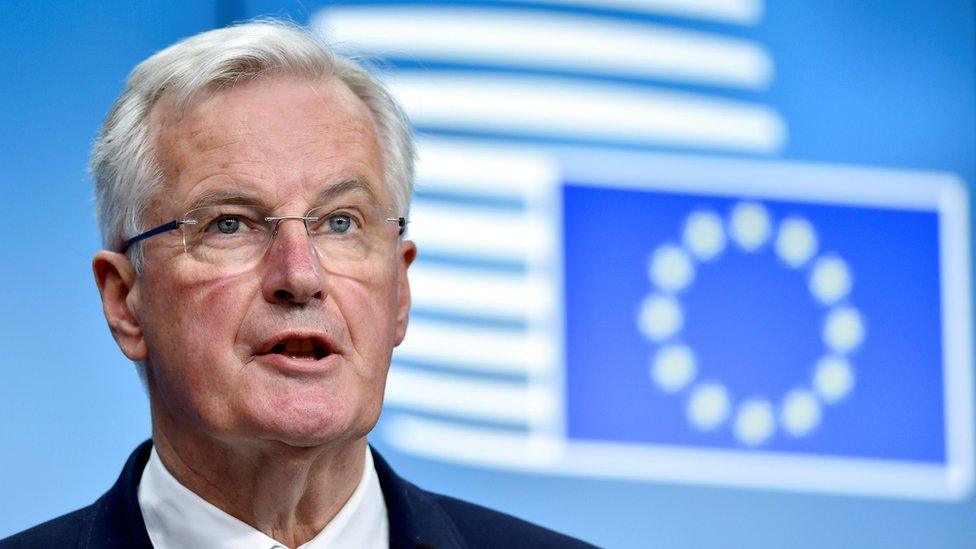The clock's ticking on Brexit talks, EU warns UK
- Published
- comments

Michel Barnier is leading the Brexit talks for the EU
The EU's chief Brexit negotiator has urged the UK to begin talks "very quickly".
Michel Barnier warned that no progress had been made on the "extraordinarily complex" talks since Theresa May invoked Article 50 in March.
"I can't negotiate with myself," he told the Financial Times, external.
Formal talks were due to begin on 19 June but the UK government has been left without a majority after Thursday's general election.
No date was set for the start of negotiations at the first meeting of British and EU officials in Brussels.
A diplomatic source said the meeting consisted of preparatory discussions ahead of the main talks and that further contacts would continue this week.
Downing Street has insisted that Thursday's general election - which Theresa May had hoped would strengthen her mandate for negotiations but ended up creating a hung Parliament - will not change the approach to Brexit it set out last year.
Under Article 50, the UK is due to leave the EU by the end of March 2019. Leaving with no deal in place could mean trade tariffs between the UK and the EU unless interim arrangements are made.
"Next week, it will be three months after the sending of the Article 50 letter," Mr Barnier told the Financial Times and other European newspapers.
"We haven't negotiated, we haven't progressed.
"Thus we must begin this negotiation. We are ready as soon as the UK itself is ready."

Will Brexit plans change?
BBC political editor Laura Kuenssberg
Enthusiastic Remainers have been quick to jump on the election result as their latest opportunity to mould the UK's departure from the EU.
The various lobby groups, including former ministers still close to some in government, have been whirring with chatter and tactical planning about how to get their voices heard. There are ideas about commissions or "neddies" - groups of advisers from business and all political parties that met in years gone by.
Even senior Tories like the leader of the Scottish Conservatives, one of their few success stories at the moment, told us yesterday "it can't just be a Tory Brexit". On first hearing that is a staggering thing to hear from Tory lips.
But before Remainers get swept up in their moment, and their ambitions swell, it's worth pondering what possibly might be on the table, and what might not, given the usual caveats about the unpredictability of what might come next.

Mr Barnier added: "Time is passing. It is passing quicker than anyone believes because the subjects we have to deal with are extraordinarily complex.
"It will take months to draw out the conditions of an orderly withdrawal.
"Let's not waste time."
Mr Barnier, a former minister in the French government, said Britons had the right to know the "consequences" of leaving the EU.
"Lots of people underestimated these consequences," he said.
"Lots of people."
'Uncertainty cannot continue'
On Twitter, the European Parliament's lead negotiator, Guy Verhofstadt, said: "We are impatiently waiting for the negotiating position of the UK gov.
"The current uncertainty cannot continue."
Mrs May called the general election claiming rival parties were trying to sabotage her Brexit plans and promised to be a "bloody difficult woman" during talks.
Since the result, which leaves the Conservatives relying on votes from the Democratic Unionist Party to stay in power, there have been calls for a more cross-party approach.
Former Tory leader William Hague is among those suggesting the setting up of a cross-party commission to seek agreement, and Scottish Conservative leader Ruth Davidson has said the economy must be at the forefront of the UK's demands.